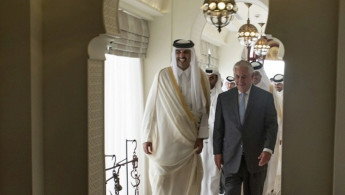Qatar and US sign counter-terror agreement amid Gulf crisis
The memorandum of understanding was signed on Tuesday during a visit to the energy-rich country by US Secretary of State Rex Tillerson.
He is in the Gulf on a mission aimed at ending a rift between Qatar and four Arab states that accuse it of supporting extremists. Qatar denies the allegation.
"Today, Qatar is the first country to sign a memorandum of agreement with the US, and we call on the countries imposing the siege against Qatar to join us as signatories to this MOU," Qatar's FM Sheikh Mohammed bin Abdulrahman Al-Thani said.
He added that the signing was "not related to the recent crisis and the blockade imposed against Qatar".
Tillerson praised Qatar for signing the deal, and for committing to the effort "to track down and disable terror financing".
"The US has one goal: To drive terrorism off the face of the earth," Tillerson said.
"Together the United States and Qatar will do more to track down funding sources, will do more to collaborate and share information, and will do more to keep the region and our homeland safe."
Senior Tillerson adviser R.C. Hammond said the deal outlines “future efforts Qatar can take to fortify its fight against terrorism and actively address terrorism funding issues.”
"This is a hopeful step forward," he added.
 |
Tillerson told reporters in Doha that Qatar had 'reasonable' views in the month-old diplomatic row with Arab neighbours and he was hopeful of progress towards a resolution |  |
Earlier on Tuesday Tillerson told reporters in Doha that Qatar had "reasonable" views in the month-old diplomatic row with Arab neighbours and he was hopeful of progress towards a resolution.
|
Saudi Arabia, Bahrain, UAE and Egypt imposed sanctions last month, accusing Qatar of financing extremist groups and allying with Iran, the Gulf Arab states' arch-foe, something it denies.
"I am hopeful we can make some progress to begin to bring this to a point of resolution," Tillerson said alongside his Qatari counterpart.
"I think Qatar has been quite clear in its positions, and I think those have been very reasonable," Tillerson said.
But Tillerson declined to comment on timeline for resolving the dispute because discussions are ongoing.
“My role here is to support the efforts of the emir of Kuwait and the Kuwaiti mediator to bring what we can to the discussions to help both sides more fully understand the concerns of the relative parties and also point out possible solutions to those," he said in Doha.
Tillerson and British National Security Adviser Mark Sedwill met on Monday with officials from Kuwait, which is acting as a mediator, in order to patch up the row among the Western-allied countries.
The State Department said Tillerson was also expected to travel to Saudi Arabia, where he will meet with the foreign ministers of the four blocking countries in Jeddah on Wednesday.
Following those discussions, the United States, Britain and Kuwait urged all parties to resolve their dispute quickly through dialogue, Kuwait state news agency KUNA reported.





 Follow the Middle East's top stories in English at The New Arab on Google News
Follow the Middle East's top stories in English at The New Arab on Google News
![The UAE is widely suspected of arming the RSF militia [Getty]](/sites/default/files/styles/image_330x185/public/2024-11/GettyImages-472529908.jpg?h=69f2b9d0&itok=Yauw3YTG)
![Netanyahu furiously denounced the ICC [Getty]](/sites/default/files/styles/image_330x185/public/2024-11/GettyImages-2169352575.jpg?h=199d8c1f&itok=-vRiruf5)
![Both Hamas and the Palestinian Authority welcomed the ICC arrest warrants [Getty]](/sites/default/files/styles/image_330x185/public/2024-11/GettyImages-2178351173.jpg?h=199d8c1f&itok=TV858iVg)